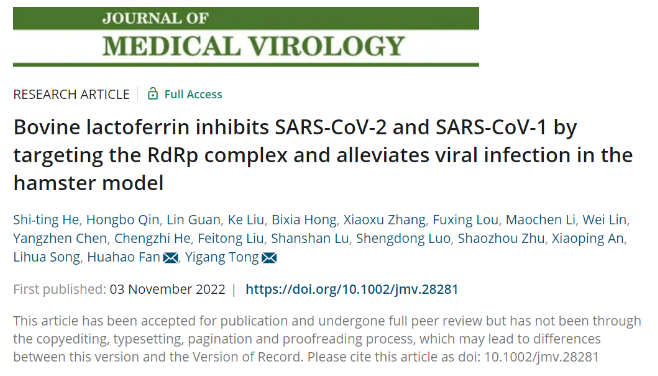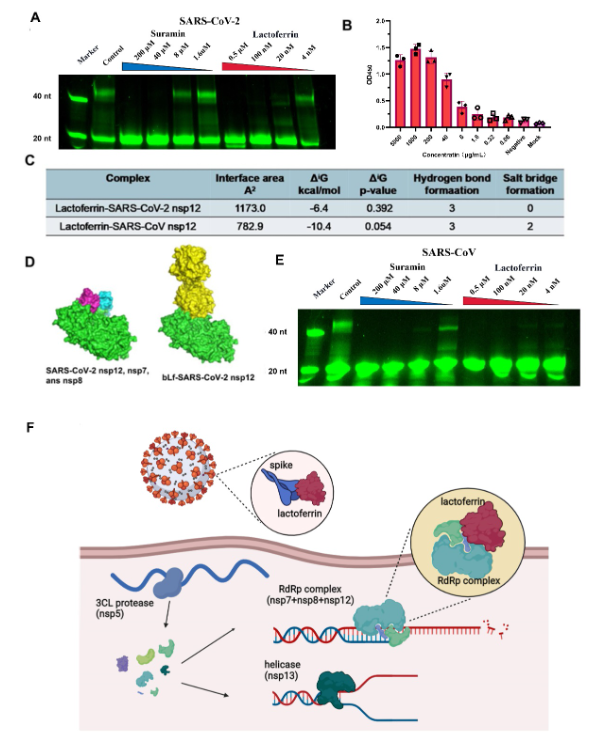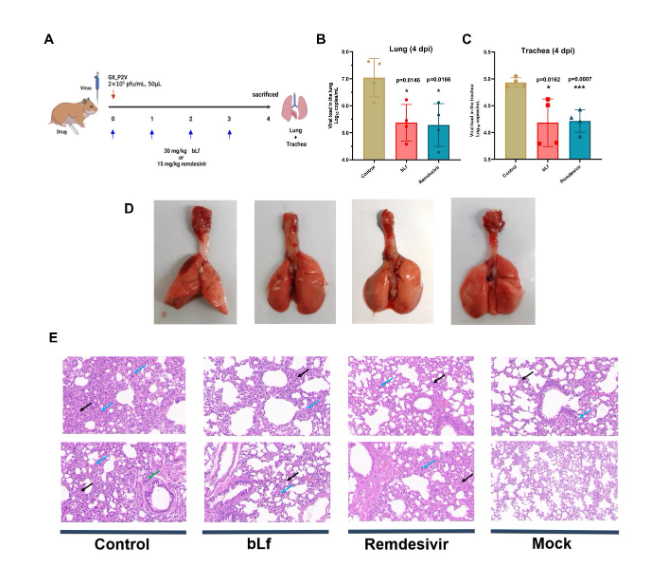In early November 2022, Tong Yigang, Fan Huahao and others at Beijing University of Chemical Technology published a research paper titled "Bovine lactoferrin inhibits SARS-CoV-2 and SARS-CoV-1 by targeting the RdRp complex and alleviates viral infection in the hamster model" in the international virology journal "Journal of Medical Virology" (IF=20.693) online, elucidating the mechanism of action of bovine lactoferrin in inhibiting SARS-CoV-1 and SARS-CoV-2 infected cells in breast milk.

In 2020, the research team and collaborators for the first time discovered that breast milk can effectively block the infection of the novel coronavirus at the cellular level. The related study was published in "Signal Transduction and Targeted Therapy" and was featured on the cover of the journal's issue. However, the specific antiviral monomeric components and mechanisms of action remain unclear. In this study, the authors tested the antiviral effects of various proteins and carbohydrates with high contents in breast milk against coronaviruses. It was found that lactoferrin had the best effect, significantly inhibiting the entry and replication of SARS-CoV-2 virus-like particles (SARS-CoV-2 trVLP) and the GX_P2V virus, a virus similar to the novel coronavirus. In addition to the previously reported inhibition of the S protein binding to heparan sulfate on the cell surface, lactoferrin can inhibit virus entry by blocking the receptor-binding domain (RBD) from binding to human angiotensin-converting enzyme 2 (hACE2). Experimental data using a pseudovirus with the S protein of the novel coronavirus VSV showed that lactoferrin significantly inhibits the entry of various prevalent mutant strains, including omicron. In terms of the mechanism of action after entry, the authors studied several important drug targets after coronavirus entry (RNA-dependent RNA polymerase RdRp, 3CL protease, helicase). They first discovered that lactoferrin inhibits the activity of the novel coronavirus RdRp to suppress viral replication after entry. Additionally, lactoferrin is the first protein found to have inhibitory activity against the RdRp of both SARS-CoV-1 and SARS-CoV-2.

Finally, researchers utilized a hamster model infected with pangolin coronavirus GX_P2V to validate the in vivo antiviral effects of lactoferrin. Lactoferrin was able to significantly decrease the viral load in the lungs and trachea of infected mice, and notably alleviate lung pathology. Lactoferrin, a protein encoded by mammals, known for its antiviral effects against other important human pathogens, has been extensively studied. This research elucidates the specific mechanisms of lactoferrin's antiviral action against coronaviruses, particularly post-cell entry, and its in vivo efficacy against coronaviruses. This study lays the foundation for lactoferrin as a promising antiviral agent, highlighting its potential for further development in combating coronaviruses.

Beijing University of Chemical Technology Professor Tong Yigang and Associate Professor Fan Huahao are the corresponding authors of this paper, with Master's student He Shiting, PhD student Qin Hongbo, and Master's student Guan Lin as the co-first authors. Beijing University of Chemical Technology is the sole completion unit. This research was supported by the National Natural Science Foundation of China, the Key Research and Development Program of the Ministry of Science and Technology, and the lateral project of Jianhe Group. Researcher He Chengzhi from Beijing University of Chemical Technology, Professor Song Lihua, Dr. Liu Feitong from Jianhe Group, and Professor Ding Qiang from Tsinghua University provided important assistance for the successful completion of this research.
Full text link: https://onlinelibrary.wiley.com/doi/epdf/10.1002/jmv.28281
